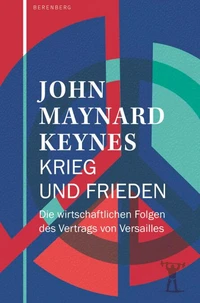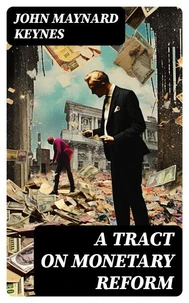A Revision of the Treaty. Being a Sequel to The Economic Consequence of the Peace
Par :Formats :
Disponible dans votre compte client Decitre ou Furet du Nord dès validation de votre commande. Le format ePub est :
- Compatible avec une lecture sur My Vivlio (smartphone, tablette, ordinateur)
- Compatible avec une lecture sur liseuses Vivlio
- Pour les liseuses autres que Vivlio, vous devez utiliser le logiciel Adobe Digital Edition. Non compatible avec la lecture sur les liseuses Kindle, Remarkable et Sony
 , qui est-ce ?
, qui est-ce ?Notre partenaire de plateforme de lecture numérique où vous retrouverez l'ensemble de vos ebooks gratuitement
Pour en savoir plus sur nos ebooks, consultez notre aide en ligne ici
- Nombre de pages156
- FormatePub
- ISBN406-4-06-611963-8
- EAN4064066119638
- Date de parution19/05/2021
- Protection num.Digital Watermarking
- Taille732 Ko
- Infos supplémentairesepub
- ÉditeurGOOD PRESS
Résumé
In "A Revision of the Treaty, " John Maynard Keynes presents a passionate and rigorous critique of the Treaty of Versailles, arguing for a reconsideration that acknowledges the economic realities of post-World War I Europe. Keynes employs a clear, persuasive style infused with economic analysis, illustrating the dire consequences of the treaty'Äôs reparations on Germany and, consequently, on the stability of Europe.
This work holds a significant place within the context of early 20th-century economic thought, as it serves as a precursor to Keynesian economics, emphasizing the interconnectedness of international economics and the social implications of fiscal policies. John Maynard Keynes was a prominent British economist whose insights reshaped economic theory and policy in the 20th century. His experiences during and after the war deeply influenced his views; having witnessed the economic turmoil that ensued, he recognized that punitive measures could only exacerbate instability.
This personal and professional context informs the urgency in his call for a revision of a treaty he believed was fundamentally flawed, rooted more in vengeance than in recovery. I highly recommend "A Revision of the Treaty" to readers interested in economic history, international relations, and the fundamental roots of modern economic policies. Keynes' work remains relevant today, providing valuable insights into the consequences of financial decisions made in the aftermath of conflict.
This work holds a significant place within the context of early 20th-century economic thought, as it serves as a precursor to Keynesian economics, emphasizing the interconnectedness of international economics and the social implications of fiscal policies. John Maynard Keynes was a prominent British economist whose insights reshaped economic theory and policy in the 20th century. His experiences during and after the war deeply influenced his views; having witnessed the economic turmoil that ensued, he recognized that punitive measures could only exacerbate instability.
This personal and professional context informs the urgency in his call for a revision of a treaty he believed was fundamentally flawed, rooted more in vengeance than in recovery. I highly recommend "A Revision of the Treaty" to readers interested in economic history, international relations, and the fundamental roots of modern economic policies. Keynes' work remains relevant today, providing valuable insights into the consequences of financial decisions made in the aftermath of conflict.
In "A Revision of the Treaty, " John Maynard Keynes presents a passionate and rigorous critique of the Treaty of Versailles, arguing for a reconsideration that acknowledges the economic realities of post-World War I Europe. Keynes employs a clear, persuasive style infused with economic analysis, illustrating the dire consequences of the treaty'Äôs reparations on Germany and, consequently, on the stability of Europe.
This work holds a significant place within the context of early 20th-century economic thought, as it serves as a precursor to Keynesian economics, emphasizing the interconnectedness of international economics and the social implications of fiscal policies. John Maynard Keynes was a prominent British economist whose insights reshaped economic theory and policy in the 20th century. His experiences during and after the war deeply influenced his views; having witnessed the economic turmoil that ensued, he recognized that punitive measures could only exacerbate instability.
This personal and professional context informs the urgency in his call for a revision of a treaty he believed was fundamentally flawed, rooted more in vengeance than in recovery. I highly recommend "A Revision of the Treaty" to readers interested in economic history, international relations, and the fundamental roots of modern economic policies. Keynes' work remains relevant today, providing valuable insights into the consequences of financial decisions made in the aftermath of conflict.
This work holds a significant place within the context of early 20th-century economic thought, as it serves as a precursor to Keynesian economics, emphasizing the interconnectedness of international economics and the social implications of fiscal policies. John Maynard Keynes was a prominent British economist whose insights reshaped economic theory and policy in the 20th century. His experiences during and after the war deeply influenced his views; having witnessed the economic turmoil that ensued, he recognized that punitive measures could only exacerbate instability.
This personal and professional context informs the urgency in his call for a revision of a treaty he believed was fundamentally flawed, rooted more in vengeance than in recovery. I highly recommend "A Revision of the Treaty" to readers interested in economic history, international relations, and the fundamental roots of modern economic policies. Keynes' work remains relevant today, providing valuable insights into the consequences of financial decisions made in the aftermath of conflict.






![Das Ende des Laissez-faire. Mit einem Essay von Nikolaus Piper. [Was bedeutet das alles?]](https://products-images.di-static.com/image/john-maynard-keynes-das-ende-des-laissez-faire/9783159616988-200x303-1.webp)
